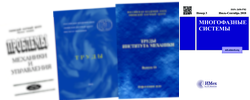
 ISSN 2542–0380 |
Труды Института механики им. Р.Р. Мавлютова
Электронный научный журнал | Electronic Scientific Journal
Proceedings of the Mavlyutov Institute of Mechanics
|

 ISSN 2542–0380 |
Труды Института механики им. Р.Р. Мавлютова
Электронный научный журнал | Electronic Scientific Journal
Proceedings of the Mavlyutov Institute of Mechanics
|
For the successful functioning of the robot team, the necessary condition is the availability of sufficient energy resources and the mechanism for their effective distribution within the group. Reducing the consumption of resources is planned using the optimal distribution of tasks from the point of view of energy costs, and to increase the effectiveness of the collective — thanks to the use of energy exchange mechanisms between agents. The proposed variant of the power system’s architecture for an individual robot, the algorithm of its operation and hardware are considered as the basis for the synthesis of an intelligent monitoring and managing energy supplies system, which allows the redistribution of the collective energy resources among robot-agents in accordance with the chosen behavior strategy. The main components of the being developed system are wireless energy exchange modules, an energy management system and a hardware&software complex that implements support for both individual and group management of energy flows.
collective behavior of robots,
wireless transmission of energy,
mobile robots,
management of rechargeable batteries,
shared energy resource
Problem: The architecture was chosen and has been developed the methodology for synthesizing the hardware and software of the power supply system of the robot, the agent of the collective, was taken into account, which takes into account the specifics of the field of application, which allows increasing the autonomous operation time, ensuring a guaranteed result and increasing the reliability of the robot team.
Methodology: Methods of synthesize specialized architectures of information-control systems, the foundations of wireless energy transmission technology, optimal algorithms for task distribution.
Results: The original architecture of the power supply system of the robot is obtained, which allows to control not only the process of charging the on-board batteries, but also to control the processes of energy consumption-distribution. The technology of energy exchange between the agents of the collective, based on wireless technologies of energy transfer, has been developed.
Findings: The solutions obtained will be used as a hardware-software basis for the synthesis of an intelligent control system for a robot team working in an unknown environment.